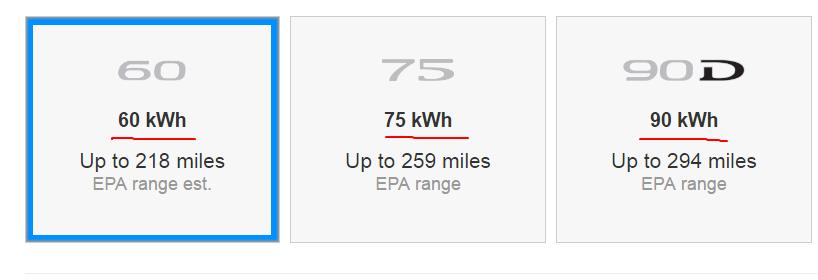Projects -> Tesla
So, earlier today, I've attempted to shed some light on the fact that almost none of the variants of the Model S/X battery packs are actually the capacity of their batteries. I'm pretty sure that that thread elsewhere will end up being either removed, locked, or otherwise too filled with noise to be useful, so, have to post here (like I should have in the first place).


Today, I discovered that the capacity of the software-limited "60"'s is 62.4 kWh usable, and unlocked to a full "75" becomes 72.6 kWh usable. So, pay for a 15 kWh upgrade, get 10. Seems a little fishy to me, and definitely misleading.

Seems any time I call Tesla out on anything like this, everyone's argument for defending Tesla on this is always the same nonsense... and there are no shortage of people jumping to defend Tesla, either. It's kind of ridiculous.
"It's the same as hard drive capacity!" --- No, hard drive capacity actually has ambiguity in terms... kWh has no ambiguity.
"It's really range that matters, who cares about capacity?" If range is all that matters, why specify pack capacity? Oh, because it actually does matter? The horror.
Since elsewhere you're just going to find folks trying to twist the facts, here are the raw facts as taken from Tesla's own BMS data (and most of these stats confirmed at the cell level):
- Original 60 - ~61 kWh total capacity, ~58.5 kWh usable.
- 85/P85/85D/P85D - ~81.5 kWh total capacity, ~77.5 kWh usable
- 90D/P90D - ~85.8 kWh total capacity, 81.8 kWh usable
- Original 70 - ~71.2 kWh total capacity, 68.8 kWh usable
- 75/75D - 75 kWh total capacity, 72.6 kWh usable
- Software limited 60/60D - 62.4 kWh usable
- Software limited 70/70D - 65.9 kWh usable
As you can see, the best buys are certainly the 60 variants. You get the closest real capacity to the advertised specification, and sometimes more than advertised. On the rest you're being lied to by marketing. Even ignoring the issue of usable vs unusable capacity, I don't know in what world 81.5 rounds up to 85 instead of down to 80... nor how it's excusable to round UP on a spec like this at all. If anything this should be rounded down in the customer's favor in all cases. At least no one could say that was shady. This is shady, however.
Someone actually tried to tell me earlier that "Tesla doesn't advertise kWh as a specification!"... let's fact check that with a trip to Tesla's order page:

(red underline is mine)
Seems this is a specification, and a false one in almost every instance.
Another argument to squash: "But you're not buying a battery, you're buying a car with an amount of range!"
Actually, the battery is its own part, and has its own label that specifies its supposed capacity (same as the badges).
So what gives?
Honestly, I don't know. If people didn't care about the capacities and only cared about range, why not advertise the actual capacities or the rounded down capacities instead of making up numbers? Tesla doesn't HAVE to lie about these things to sell cars. It just makes them look bad when people call them out on it and does them no good. And really, this is worse than the false advertising of the P85D horsepower since it affects a huge percentage of Tesla customers. (On that note, I hope something happens in the USA on the P85D false advertising issue soon, similar to the Norway case.)
Unfortunately, I don't have unlimited time to combat noisy forums and non-content these days, so, going to provide the facts here, as always, and you can either accept them or try to deny them... good luck with the latter. If you have any facts to bring to that argument I'm all ears. All I got from my attempt at a forum discussion was basically a bunch of hand waving and name calling.
I'm not against Tesla. On the contrary, I want to see them succeed.... which is why they need to stop with these misleading and shady practices that can do nothing but bite them in the ass later.
-wk